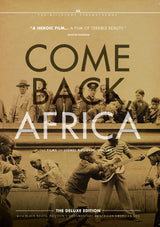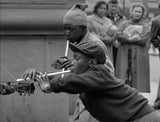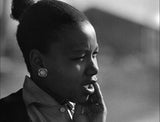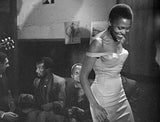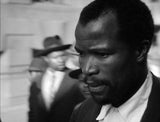Milestone Films
Come Back, Africa / Black Roots
Buy the DVD or Blu-ray

Lionel Rogosin’s 1959 powerful classic Come Back, Africa is one of the bravest and best of all political films. After witnessing firsthand the terrors of fascism as a soldier in World War II, Lionel Rogosin vowed to fight against it wherever and whenever he saw it reemerging. In an effort to expose “what people try to avoid seeing,” Rogosin travelled to South Africa and secretly filmed Come Back, Africa, which revealed the cruelty and injustice suffered by black and colored peoples under apartheid.
Before beginning the production of Come Back, Africa, Rogosin spent several months touring Africa, becoming accustomed to the way of life in South Africa and acquiring a sense of the apartheid government’s sensitivity to anti-government “conspiracies” — such as the very film he wished to create.
Much of Come Back, Africa was filmed in Sophiatown, a ghetto reserved for blacks and a vibrant center of music, art, literature and politics that has since become legendary. Residents included Desmond Tutu, Nelson Mandela, Father Trevor Huddleston, Hugh Masekela and three of the film’s main contributors – author/journalists Bloke Modisane and Can Themba and the already celebrated singer, Miriam Makeba. But even as they filmed, Sophiatown was already in the process of being demolished and its residents forcibly removed. Shortly after production ended, Sophiatown was emptied, razed and rebuilt as a whites-only suburb called Triumf. (Makeba, later known world-wide as “Mamma Africa,” helped popularize “Meadowlands,” a song against the forced removals, and in 1959 recorded “Sophiatown is Gone.”)
In making Come Back, Africa, Rogosin’s goal was to reveal the harsh injustice of apartheid. In order to make a film that honestly and accurately portrayed the life of people in Sophiatown (as he did with his first film, On the Bowery), the filmmaker spent almost a year meeting with activists and writers, both black and white. Rogosin cast the film before writing the screenplay, basing the story on the experiences of the cast and crew. The final script was little more than a sketch of plot points; the actors created their own dialogue in order to create an authentic representation of their lives.
Rogosin took the fight for equality to his homeland with his astonishing fourth feature Black Roots. The extraordinary cast, including Reverend Frederick Douglass Kirkpatrick, attorney and feminist activist Florynce "Flo" Kennedy, musicians Jim Collier, Wende Smith, Larry Johnson and Reverend Gary Davis tell stories of heartbreak and despair while their songs blow the roof off the rafters. A deeply humanist film, Black Roots combines tales of oppression with hauntingly beautiful images of the faces of black men, women and children.
READ MORE ABOUT
COME BACK, AFRICA HERE
BLACK ROOTS HERE.
The home DVD and Blu-Ray is a two-disc REGION-FREE boxed set that features
Disc one
Come Back, Africa South Africa. 1959, 86 minutes. Mono sound. Aspect ratio 4:3. Restoration Cineteca
del Comune di Bologna. From the 2K Restoration. SDH subtitles.
A Martin Scorsese Introduction. 2 minutes.
An American in Sophiatown The making of Come Back, Africa. Directed by Michael Rogosin &
Lloyd Ross. 64 minutes.
Lionel Rogosin talks about Come Back, Africa. Radio Interview, 1978, 19 minutes.
Come Back, Africa Theatrical Trailer. 2 minutes.
Disc two
Black Roots United States. 1970, 63 minutes. Mono Sound. Aspect ratio: 4:3. SDH subtitles.
Bitter Sweet Stories Directed by Michael Rogosin. 27 minutes. Color/B&W. Documentary on the making
of Black Roots.
Have You Seen Drum Recently? Directed by Jürgen Schadeberg. 1989, 74 minutes.
An Explanation of Home, Classroom, and Public Performance Rights
Through our distribution partner, Kino Lorber, Milestone provides a variety of licensing to suit all needs. Our standard institutional licensing packages are designed to provide colleges, universities and qualified non-profits with the best value for multiple uses, and our one-time community screening licenses allow any organization to exhibit high-quality films for a reasonable fee. Please note that all licensing carries restrictions on audience numbers and/or geographic range.
STANDARD INSTITUTIONAL LICENSING
- CLASSROOM RIGHTS allow unlimited use in face-to-face classroom situations for the life of the media, restricted to a single campus or location. Please note that this license doesn't include public screenings or digital transmission of any kind.
- PUBLIC PERFORMANCE RIGHTS (PPR) allow educational and nonprofit groups to exhibit our films to groups of 100 or fewer individuals where admission is not charged. The term of the public performance license is for the life of the DVD. However, if you intend to charge admission, expect an audience over 100, or publicly advertise the screening, then we ask that you contact us regarding an exhibition fee. Films purchased without Public Performance Rights are restricted for individual viewing or face-to-face teaching in the classroom only.
- DIGITAL SITE LICENSES (DSL) allow colleges, universities and nonprofits to locally host and stream to their community on a closed, password-protected system for the life of the digital file.
- K-12 PPR comes with limited performance rights so films can be shown in classrooms, at PTA meetings, during after school programs, and transmitted on a closed-circuit system within a K-12 school building or on a single campus.
For all educational licenses and screenings, please Estelle Grosso, Director of Educational and Non-Theatrical Sales & Distribution at Kino Lorber (Milestone’s distribution partner) at: egrosso@kinolorber.com.
The purchase of DVDs, DVD-Rs, and Blu-rays at the institutional rate by anyone outside of a North American non-profit educational institution does not grant rights for public performance or streaming.
Any continuous or loop screenings as part of a museum exhibition must also be licensed separately. Inquiries must be negotiated directly by emailing egrosso@kinolorber.com.
Information for Exhibitors Screening DCPs and Film Prints
All bookings must be made by email correspondence with George Schmalz, Director of Theatrical Sales at Kino Lorber (Milestone’s distribution partner) at: gschmalz@kinolorber.com to negotiate terms and insure a screening copy is available. An order is only finalized when Kino Lorber sends written confirmation.
DCPs are shipped insured for their cost via Federal Express or UPS and must be returned the same way or by an equivalent method. Shipping and handling charges for outgoing DCPs appear on your invoice. The immediate return or transshipment (as directed) of all DCPs is your responsibility.
DCPs should be returned to:
Milestone Film & Video
38 George Street
Harrington Park, New Jersey 07640-0128
United States
35mm and 16mm prints are shipped insured for their cost via Federal Express or UPS and must be returned the same way or by an equivalent method. Please do not ship prints back via US Mail. Exhibitor pays to ship both ways. Shipping and handling charges for outgoing prints appear on your invoice. The immediate return of all prints is your responsibility.
Prints should be returned insured for $1,000 to:
Iron Mountain
Attn: Milestone Account
235 Main Street
Little Falls, NJ 07424
201.944.3700
For public screenings, advertising materials can be requested by contacting jhertzberg@kinolorber.com.
Milestone is the exclusive licensor for all the titles in this catalog, all of which are available from Milestone’s distribution partner Kino Lorber. in their complete versions.
